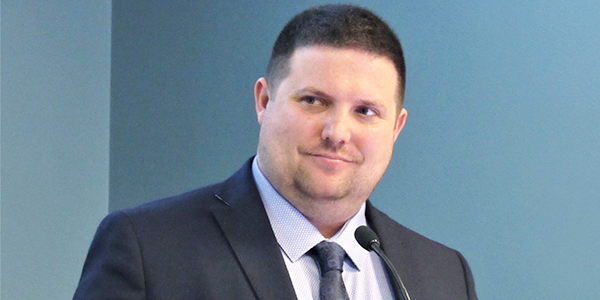By Amanda Durish Cook
CARMEL, Ind. — MISO is toying with the idea of foreshortening its 2020 Transmission Expansion Plan (MTEP) process in order to maximize time spent on the 2021 cycle of transmission projects.
The RTO last week said it wants stakeholder approval to stop work on the four 15-year future scenarios used in the 2020 MTEP (requiring it to instead rely on an older version of futures) and to forego the usual planning studies in favor of smaller, specialized studies to identify projects.
MISO Planning Manager Tony Hunziker said the idea is to finish MTEP 20 work early to provide more time to completely retool the future scenarios in time for the 2021 cycle.
“Throughout this process, there’s been this building momentum and increased interest in starting MTEP 2021 futures as early as possible,” Hunziker told stakeholders at a Planning Advisory Committee meeting Wednesday.
Stakeholders asked if the 2020 plan would still contain an Appendix A, the annual list of transmission projects recommended to the Board of Directors for review and approval.
“There would certainly be an Appendix A and the usual reliability projects. This would more impact economic projects,” Hunziker said.
If MISO stops work on MTEP 20, it won’t have the usual Market Congestion Planning Study for the cycle.
“In its place, we could do a couple targeted economic studies,” Hunziker suggested. “We haven’t completely thought through everything yet. We wanted to put this out there and judge stakeholders’ interest.”
He assured stakeholders that MISO wouldn’t skip economic transmission planning for the year; it would just come in a different form.
“We’re still very committed to the economic planning process,” Hunziker said.
He said moving forward with MTEP 20 futures development would “tie staff up until mid- to late summer.”
“If we continue down the path of completing MTEP 2020 futures, it’s going to slide down the time that we can start on the 2021 futures,” Hunziker said.
Stopping work on MTEP 20 would pull staff’s focus entirely to developing MTEP 21 futures, he said. Staff have previously promised stakeholders an extensive rework of the four futures that guide the annual transmission planning process in time for 2021.
MISO had been using the same set of futures with only minor edits for the last three years to evaluate transmission projects. The RTO developed the futures in collaboration with stakeholders with long-term use in mind. (See MISO: Minimal Change to 2019 Tx Planning Futures.)
In April, MISO said it would boost renewable generation estimates in each of the four 15-year future scenarios, bumping minimum penetration levels from 15 to 35% of the generation mix to 20 to 40%. (See Renewables Outlook to Get Boost in MTEP 20 Futures.) However, MISO’s pivot puts that proposal in doubt, with Hunziker saying it could either keep or discard the larger renewable assumptions.
In halting further efforts on MTEP 20, MISO would likely begin 2021 futures discussions in July and schedule four special workshops in fall to gauge stakeholder expectations around a new set of futures.
“Either way we go, we’ll start the MTEP 2021 futures discussion early,” Hunziker said, adding that MISO would begin discussions on MTEP 21 with or without a MTEP 20 work stoppage by September. MISO usually begins futures development in January of each year for the upcoming year’s transmission planning cycle.
A Hijacking?
Some stakeholders pointed out the move would give MISO 27 months to develop futures, risking that enough time could pass for the freshly developed futures to themselves become stale. But Hunziker said the first few months would be spent on how to improve the process and settle on what new data should inform the scenarios.
Clean Grid Alliance’s Natalie McIntire asked how the move would affect MISO’s annual interregional transmission planning efforts with SPP and PJM. She said that because MISO no longer builds a joint model with its neighboring RTOs, it should keep up with grid modeling.
MISO staff said they weren’t yet sure how the new course of action would interact with next year’s interregional planning.
“I’m really surprised and concerned by this,” McIntire said. “It’s concerning that a small number of stakeholders can hijack the process,” suggesting that only a few influential members were in favor of truncating MTEP 20.
However, Xcel Energy’s Drew Siebenaler thanked MISO for proposing a “pared-down” MTEP 20. He said the move would give the RTO the time necessary to evaluate several new state and company renewable targets, new resource retirements and recent zero-carbon commitments for use in its futures.
“Who says we’re going to have that kind of clarity in five months?” consultant Roberto Paliza challenged. “I just don’t see that we’ll have a new set of futures that are radically different.”
“We’re just about done with the MTEP 20 discussion here,” McIntire said. “The whole idea that we would get rid of a big part of MTEP 20 … I don’t think that extra two months [for MTEP 21 futures] is going to be that significant.”
But Hunziker pushed back on that assertion, saying his staff don’t have time to properly facilitate both MTEP 20 futures and studies and early preparations on MTEP 21. He asked for more comments on the issue by June 28.





